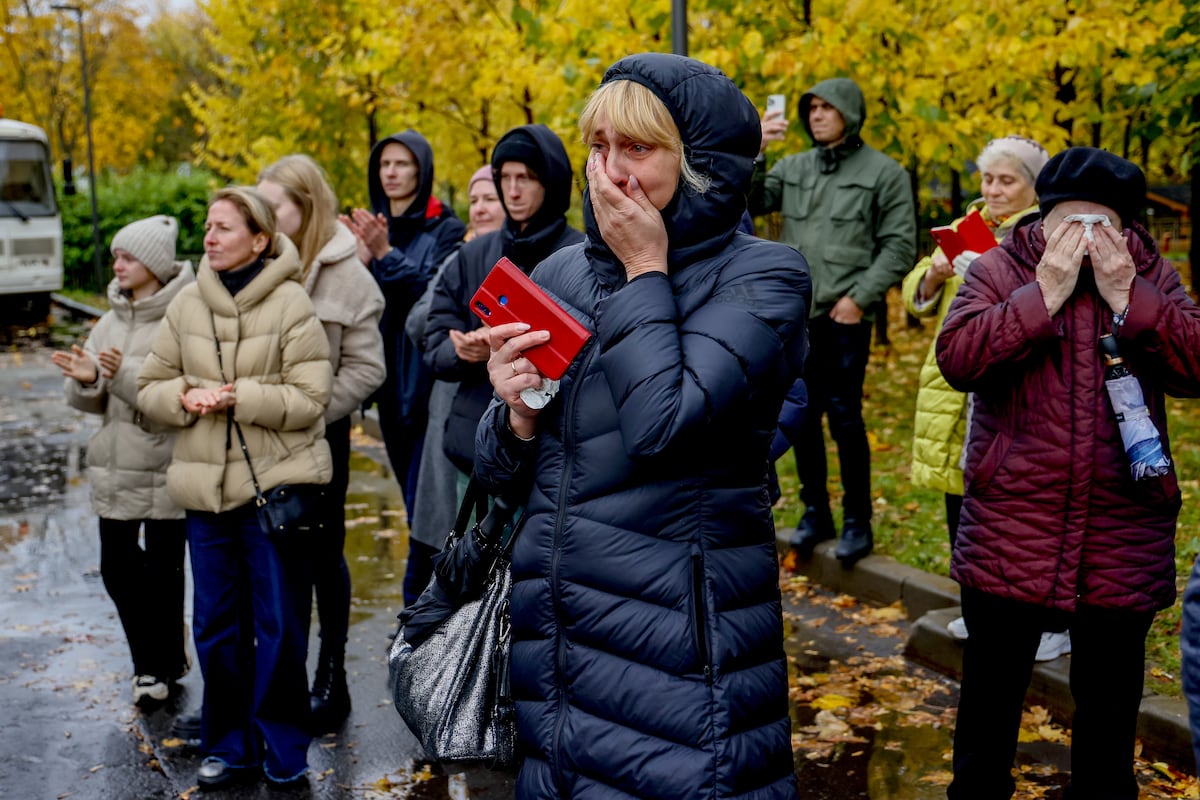Women can be a powerful force in Russia. Their protests to bring their men home helped bring peace in the First Chechen War. And they built the country up after World War II in countless homes without fathers, just mothers and grandmothers. On September 21, 2022, Vladimir Putin decreed a massive mobilization to continue the offensive against Ukraine that had been launched a few months earlier. While men boarded buses and trains, women took to the streets. The threat of destabilization loomed over the Kremlin, but it ultimately calmed the storm with a campaign of pressure. Three years later, fear reigns among women, although some try to keep the protest alive.
The Ministry of Defense declared that it had mobilized 300,000 men in September 2022. It was also the last time it provided a death toll in the ranks of the Russian military, reporting 5,937 fatalities among its professional forces. An analysis of data by three media outlets — Mediazona, Meduza, and the BBC — suggests that around 200,000 Russians have lost their lives so far in the war.
“We show the reality that the authorities try to hide behind an appearance of stability to those citizens who have not been directly affected by the war,” says a member of the women’s platform of mobilized people, Way Home (Put Domói in Russian), on request of anonymity.
 Military propaganda in the Moscow metro, August 29.Contributor (Getty Images)
Military propaganda in the Moscow metro, August 29.Contributor (Getty Images)
She’s the only one who answers her phone. A handful of women who three years ago openly demanded the return of their sons and husbands no longer respond to messages. The authorities declared this movement a “foreign agent” and issued several warnings to its followers when their protests in front of monuments to Russian soldiers began to go viral. A few dozen women gathered in front of the Ministry of Defense a year ago and were arrested. Now, the few who go to the monuments do so alone, lay a flower, and leave.
At the end of last August, a court sentenced Olga Tsukanova, former director of the now-defunct Council of Mothers and Wives, to one year and seven months of hard labor, plus a two-year ban on online interactions. She had previously spent six months in pretrial detention.
“The authorities don’t make promises, they just pretend there’s no problem,” says the Way Home member. “The war seems endless, and there’s no hope of it ending tomorrow.”
Telegram, which operates in Russia with the approval of security forces, has labeled the Way Home channel as “fake.” Despite the obstacles, the movement urges its tens of thousands of followers to continue bringing flowers every Saturday to memorials to war veterans and fallen soldiers.
“We will not allow our men, the mobilized, to be forgotten. We will bring them home,” the organization warned in August after breaking a long silence on Telegram.
The bloodshed in Ukraine continues, and in the silence imposed by the Kremlin, the voices of those women who have shaken off their fear because they have already lost everything resonate even louder.
This week, the mother of a soldier who has been missing since December 2023 sent a desperate appeal to Vladimir Putin in a public video. Visibly shaken, Galina Zeleneva, from the Tambov region, asks for clarification on whether her son, Vitali Klychnikov, “has died or been taken prisoner.” Through tears, she asks for his body to be returned to her “if he died defending the homeland, so that we can mourn him.”
The mother laments the wasted trips to Moscow, her unanswered letters to the Ministry of Defense and the Federal Security Service (FSB), and the attitude of her son’s father, who has reappeared to request compensation for his son’s death. “His father never took an interest in him; he didn’t even say hello to him until he was 38,” Zeleneva laments.
Elena Antiosova, a resident of the Tula region, has also made another public appeal to the authorities to bring back her twin sons. Kirill and Andrei, 28, were mobilized in September 2022 and captured by Ukrainian forces in June of the following year, according to their family.
Antiosova has confirmed their survival through statements from a comrade in the 137th Airborne Regiment and the existence of footage of their surrender. “I’m alone,” the single mother laments aloud.
“My children weren’t afraid; they stood up and went to defend Russia. My children are heroes, and for their bravery, Vladimir Vladimirovich [Putin], you awarded my children the Order of Courage,” she says in one of the many recordings she has sent to the authorities. “If you continue to remain silent, I will be forced to go to Ukraine to bring my children back,” she threatens.
For other women, there’s no consolation left. “Hello. I died yesterday, but I’ll be buried in 30 years. Yesterday, my husband died in a drone attack on his vehicle,” writes the widow of a mobilized soldier in a letter published by Way Home. “My husband managed to survive and escape injury for almost three years, but yesterday his luck ran out. He won’t see his 42nd birthday in a week,” she continues, before offering some final advice to the other women.
“Love people while they live; the dead don’t need love. And avoid sending them to war by any means possible. There’s no way out except in a coffin,” the letter concludes.
Desertions increase
Recruitment statistics are a state secret. As an example, the independent media outlet Vazhnie Istorii analyzed a list of 2,153 recruits in the Tomsk region. The oldest were 60 years old, and the youngest, 19. At least one in 10 has been declared dead in these three years of war, although when the wounded and missing are added, the figure rises to one in four. Nine soldiers who underwent amputations were classified as having “moderate injuries” and returned to the front.
There doesn’t seem to be any immediate mobilization in sight. According to Putin, his forces total 700,000 soldiers in Ukraine. However, the Russian government is preparing for another recruitment drive when it deems it necessary. A new electronic enlistment notification system has been in operation since August, and there have already been cases of Russians being stopped at the border while trying to leave the country. Unlike cumbersome paper-based bureaucracy, this mechanism allows a citizen’s exit to be blocked by customs from the moment the notification is sent.
“The number of people wanting to desert the Russian army has tripled from 2023 to 2025,” Grigory Sverdlin, founder of Idite Lesom [translatable in Russian as “walk through the forest” or “get lost!”], an organization that helps those called up to flee Russia, told this newspaper. The platform claims to have helped 54,000 Russians avoid mobilization and another 2,209 escape the country.
Russia hides its defection figures. The Ukrainian Prosecutor’s Office recorded more than 81,000 cases as of last year. According to another investigation by Vazhnie Istorii, at least 49,000 Russians had defected by the end of 2024.
This year’s peace talks between Russia and Ukraine, under pressure from the United States, has caused some Russians to postpone their escape plans. “We had planned the routes, but they preferred not to risk it and waited for the war to end. After two or three months of waiting, there was a surge in people wanting to defect again,” Sverdlin says.
For the Way Home member, these negotiations “have been a farce, an attempt to deceive and provide a new spoonful of the delicacy called hope.”
Sign up for our weekly newsletter to get more English-language news coverage from EL PAÍS USA Edition
